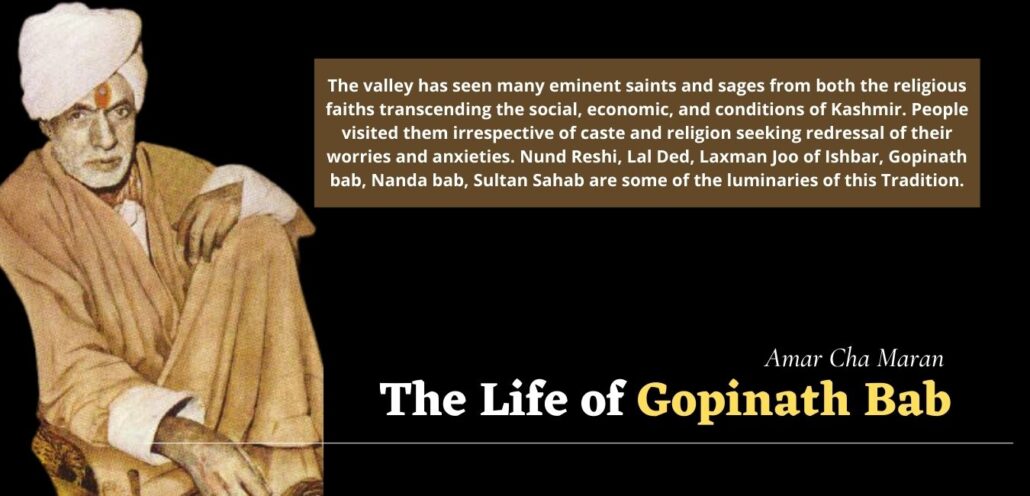
Throughout history, Kashmir has been a cradle of mysticism, nurturing renowned poets and thinkers within its boundaries. So rich is its tradition that it was known as ‘Reshvear’.
The valley has witnessed the presence of eminent saints and sages from various religious faiths, transcending social and economic conditions. People, regardless of caste and religion, sought solace and guidance from them. Nund Reshi, Lal Ded, Laxman Joo of Ishbar, Gopinath Bab, and Nanda Bab are some luminaries of this tradition.
Among Kashmiri Pandits, very few saintly figures have left as indelible an impression on the minds of the people as Bhagawaan Gopinath Ji.
Two highly venerated mystics of contemporary Kashmir, Kashkak and Nanda Bab, recognized Bhagawaanji’s greatness. Swami Kashkak stated that Bhagawaanji received special grace from Mother Sharika, while Swami Nandlalji described Bhagawaan as ”the king of saints in Kashmir”.
Bhagawaan Gopinath Ji led a simple, austere life. He never left Kashmir, shunned publicity, and preferred anonymity on most of things he did. He was a true Kashmiri at heart and till his last day, his love for Kashmir did not die down.
Despite only completing middle school, he displayed fair knowledge of Sanskrit, Persian, Urdu, and English. He spoke little, never preached and remained engrossed in spiritual meditation, often remaining unnoticed by casual visitors for hours.
A Siddha, having attained the highest levels of spirituality, Bhagawan Gopinath Ji embodied a blend of Jnana (knowledge), Bhakhti (devotion), and Karma (action).
For many who had the fortune of meeting him, he was considered the holiest of the holy, with a healing touch and wielding Ashta Sidhis for the good of the people and the nation. To others, his unconventional behavior presented a picture of inscrutability.
His non-vegetarianism, and unorthodox ways were a mystery to the uninitiated. Ordinary humans could hardly fathom his ‘Gunateet’ and ‘Mayateet’ nature.
Born on July 3, 1898, Gopinath Bab belonged to the Bhan family in Srinagar. Inheriting spiritual teachings from his highly religious parents, Gopinath Bab showed little interest in worldly affairs from infancy.
He would sing the glories of God, and the spirit of renunciation had overtaken his young mind. Despite not completing his schooling or taking up his uncle’s Pashmina business seriously, he worked as a compositor at Vishnath Press and later at a grocer’s shop.
From the age of 20, he began daily Parikrama of Hari Parbat and spent hours absorbed in meditation in Devi Angan. Chillum was his constant companion even in those days. He recited hymns like Panchastavi, Bhawani Sahasranama, Saundaryalahri Vishnu Sahasranam, Mahima Stotra, Utpalastotravali, Guru Gita, and Bhagwadgita from memory.
The most crucial phase of his quest for self-realization began at 32. For the next seven years, he wrestled with God, emerging as a Siddha at 39, with a mangled body but a radiant spirit, having realized his true self and become one with Siva, the Ultimate Truth.
Gopinath Bab emphasized rational thought and the ability to discriminate between the real and the unreal. He often urged devotees to shed the veil of ego that enveloped their souls.
On his last Sunday on earth, May 26, 1968, he directed musicians to stop playing music, remarking, ”we shall not listen to any more music”. Two days later, on May 28, 1968, Gopinath Bab passed away, leaving behind a legacy that reverberated throughout Kashmir. As Nanda Bab mourned, ”Kashmir had been rocked by an earthquake”.
In his words, “Amar…..Chhaa…Maraan”? – does the immortal die? –
Life and death are only for the body, not for the Soul that imparts life to all living beings, irrespective of gender. The Soul is neither born nor does it die; it is eternally existent and immortal.




